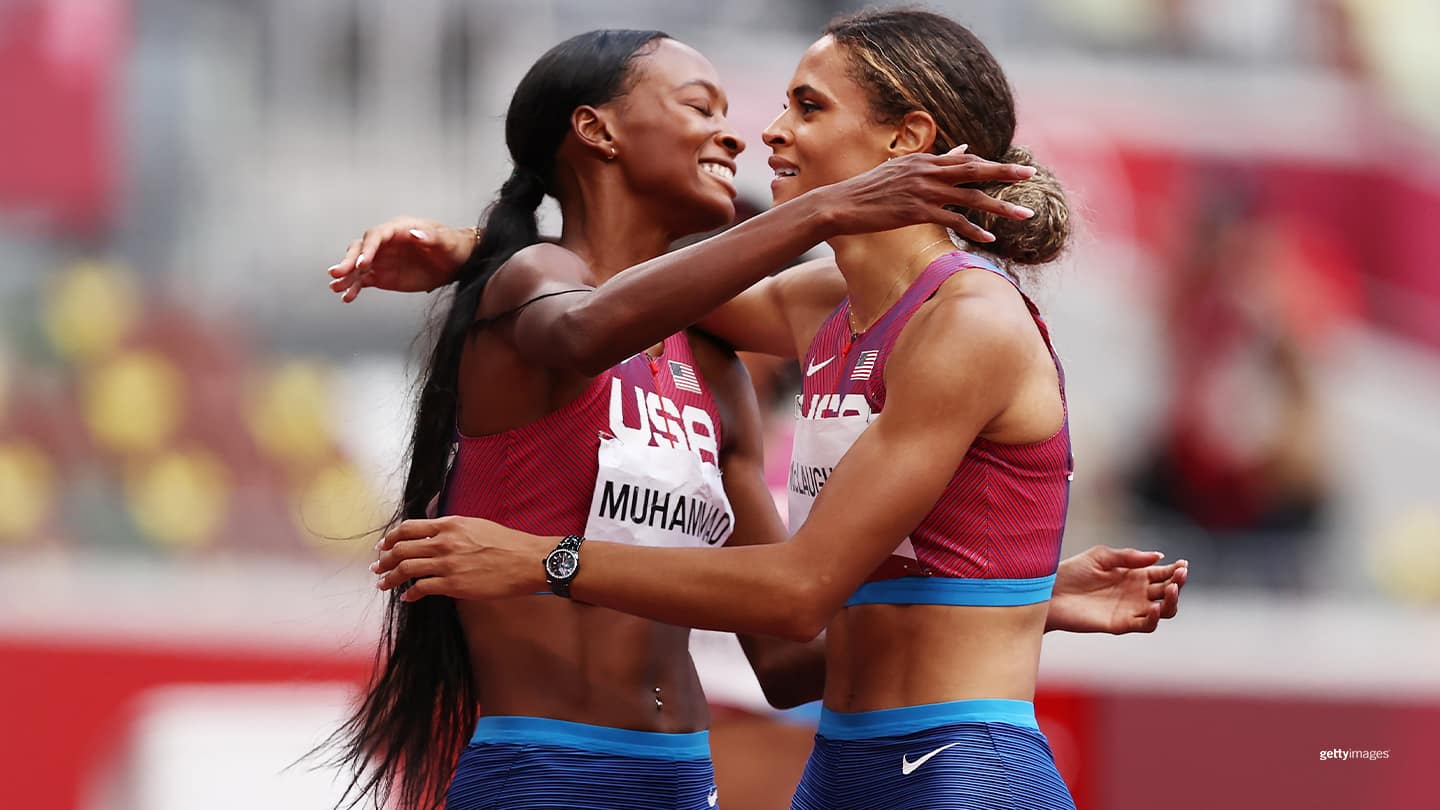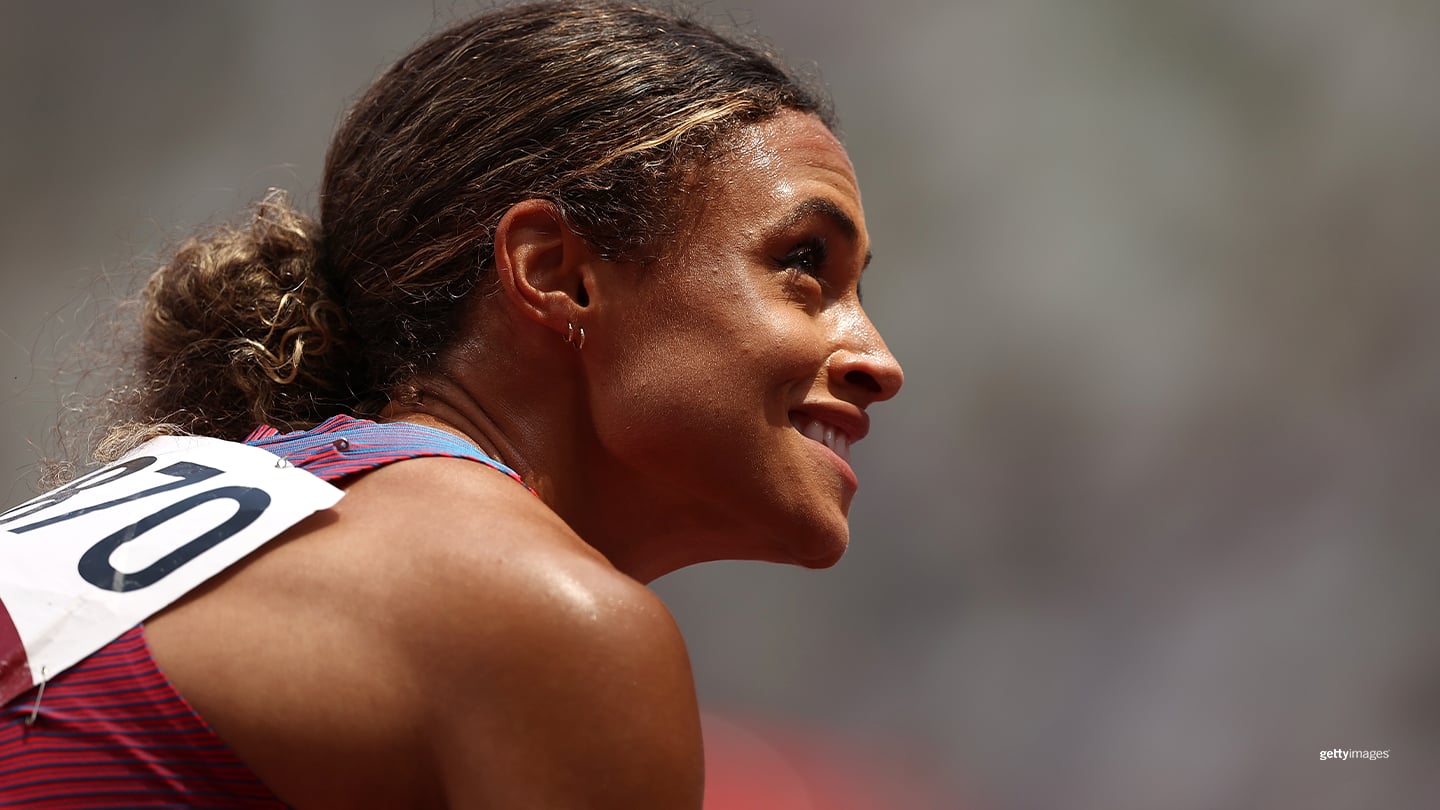
In Record-Setting Times, Sydney McLaughlin And Dalilah Muhammad Go 1-2 In The 400 Hurdles
by Chrös McDougall

Dalilah Muhammad hugs Sydney McLaughlin after competing in the women's 400m hurdles at the Olympic Games Tokyo 2020 on Aug. 4, 2021 in Tokyo.
TOKYO — In any other race in the history of the women’s 400-meter hurdles, Dalilah Muhammad would have won with a new world record time.
This was not that race.
In one of the most anticipated track & field showdowns of the Olympic Games Tokyo 2020, it was 21-year-old Sydney McLaughlin who claimed the gold medal Wednesday, using her superior closing speed to edge out the defending Olympic and world champion Muhammad at the line.
The win came in a time of 51.46, lowering the world record McLaughlin set at the Olympic trials by a staggering .44 of a second, and marked the first individual championship at this level for one of Team USA’s most celebrated track prodigies. And yet the feat was made even more impactful by beating Muhammad, the former world record holder whose time of 51.58 would have otherwise achieved that mark again today.
“I think that’s really just iron sharpening iron,” McLaughlin said. “You need somebody who’s going to push you to be your best, and I think that’s what we do so well. Every time we step on the track, it’s always something fast.”
Originally from Dunellen, New Jersey, McLaughlin’s coronation as the world’s best has been a long time coming.
A onetime prodigy in the sport, McLaughlin qualified for the Rio Games in 2016 as a 16-year-old, and she was just days past 17 when she raced there, eventually reaching the semifinals. The years since have been a steady march toward reaching her potential.
The elder Muhammad has been a key part of that journey.
A silver medalist at the 2013 world championships, she became the standard bearer in the 400 hurdles after winning the event at the Rio Games. Three years later she set the world record, then set it again a few weeks later while winning the world championship.
By then, though, McLaughlin was hot on her heels.
That year’s world championships were in Doha, Qatar. McLaughlin, in her debut at the biennial event, crossed the line in 52.23 — just seven-hundredths behind Muhammad. It was so close Muhammad wasn’t even sure who’d won.
All the while, McLaughlin was still just 20 years old.
In the summer of 2021, McLaughlin officially passed Muhammad. The turning point came at the U.S. Olympic Team Trials in June, when in a late-night race in 90-degree weather she became the first woman to break the 52-second barrier, her time of 51.90 lowering Muhammad’s world record by more than a quarter second.
That result was confirmed on the biggest stage this week in Tokyo’s Olympic Stadium.
With a steady rain falling on Monday, both hurdlers coasted through their semifinals, McLaughlin leading the field at 53.03, Muhammad second at 53.30 and no one else within .6 of a second.
In hot and sticky conditions for today’s late-morning final, the race proved to be a three-woman contest, with 21-year-old Dutch athlete Femke Bol joining the American duo.
Muhammad, running from lane seven, built and early lead and held it around the backstretch. By the time the runners were turning onto the final straightaway, McLaughlin, in lane four, was closing in fast. Muhammad still had a slight lead at the 10th hurdle; that’s when McLaughlin’s finishing speed over the final 40 meters proved to be the difference. Bol, running in lane five, was just behind the two Americans, finishing in 52.03 for the bronze medal. Fellow American Anna Cockrell started the race but was disqualified for a lane violation.
The DQ not withstanding, the race played out about as McLaughlin expected, so she never wavered when Muhammad took the early lead.
“I always know she’s going to go out (fast),” McLaughlin said. “I just knew that I had to be patient and trust that I could feel strong enough and come off 10 and give it everything I have.”
Patience, and trusting the process, can also describe her last five years.
When McLaughlin raced in Rio, she became the youngest U.S. track athlete to compete at the Olympic Games since 1972. Success early isn’t always a precursor to more success later, though. McLaughlin struggled with the grandeur of the Rio Games, and “let the atmosphere get to me,” she said.
Though seemingly on the fast lane to a professional career, she made a one-year pitstop at the University of Kentucky, where she won an NCAA title in her signature event. Then it was off to the pro ranks in the summer of 2018.
McLaughlin initially followed her coach to Texas, then moved to Los Angeles to work with a new coach. Last summer she switched coaches again, this time to team up with Bob Kersee. A legend in the sport, Kersee has coached a who’s-who of Olympic track stars, starting with his wife Jackie Joyner-Kersee and sister-in-law Florence Griffith Joyner, and extending out to recent years with Allyson Felix, the nine-time Olympic medalist who’s competing at her fifth Games in Tokyo.
McLaughlin had known Kersee, with both being based in Los Angeles. When the pandemic threw Olympic hopefuls into a state of uncertainty, their relationship grew.
“He and I had a lot of conversations just as two people, and I realized Bobby was a really great person before he was a really great coach,” McLaughlin said. “I felt he saw things in my and in my career that I didn’t see in myself.”

Sydney McLaughlin competes in the women's 400m hurdles at the Olympic Games Tokyo 2020 on Aug. 4, 2021 in Tokyo.
Early in her career, McLaughlin said she raced a lot off instinct. Under Kersee, she became more of a student of the sport, even if the process didn’t always make sense to outsiders.
So when McLaughlin lined up for her first race in 495 days this past February, at an indoor meet in Boston, then proceed to run the slowest time in the 60-meter hurdles, she knew it was all part of the process. As it turned out, McLaughlin was purposefully hurdling with her left leg — the non-dominant leg — as part of a long-term strategy to prepare for the 400 hurdles later in the year. In the longer event, hurdlers jump using both legs.
McLaughlin continued to focus on shorter events through the spring and early summer, before ramping up on her key event in June. Again, all part of the plan — one that paid off in a big way in Tokyo.
“Bobby’s number’s don’t lie,” McLaughlin said. “That’s one thing I’ve learned. When he says you can do something, you can do it.”
McLaughlin and Muhammad take pains to downplay any rivalry between them, at least in the negative connotation of the word. The two athletes push each other, they insist, but they also cheer for each other as well.
They also lean on each other for motivation.
“When you have someone that’s such a strong competitor as Sydney, you can’t mess up,” Muhammad said.
Coming into the Tokyo Games, Muhammad’s coach suggested she could hit 51.70 in the final, a time that’d chop .20 of a second off McLaughlin’s world record from the trials.
“I was like, is that fast enough?” Muhammad said.
It ended up not being near fast enough, even as Muhammad blew that target herself.
The women’s race came one day after a similar performance in the men’s 400-meter hurdles, when American Rai Benjamin ran what would have been a world record only to fall short to Norway’s Karsten Warholm, who obliterated his own world record by more than seven tenths to claim the gold medal.
The American women admitted to seeing that result and being inspired, if not a little nervous. The Tokyo track has earned a reputation for running fast, and the men’s race only increased expectations that the hotly anticipated women’s race might see historic results as well.
“I’ve been part of that journey from being the event no one watched to the event that everybody wants to watch,” Muhammad said.
The two favorites delivered, just like Warhom and Benjamin a day earlier. Like Benjamin, Muhammad’s historic result comes with a bittersweet caveat of being in second place, though she insists the final result was not actually bittersweet.
“I knew I was was ready, I knew she was capable, I believe I was capable too,” Muhammad said. “It’s not mixed emotions, I don’t even want to say that. I’m truly happy with the performance both of us put on, and kudos to Sydney.”
Coming from Queens, New York, and having later run for the University of Southern California, Muhammad developed into one of the event’s all-time greats, and she’s sustained that level for nearly a decade now. In 2021, she had to overcome injury setbacks, as well as a bout with Covid-19, yet still came to Tokyo and delivered.
In these Olympics, 41 women finished the preliminary heats in the open 400, where they didn’t need to contend with 10 hurdles blocking their path. McLaughlin and Muhammad ran faster times today than all but 18 of them.
In their actual race, Muhammad ran the second fastest time in history, the only woman faster being the generation talent who ran beside her. And both could also have another gold-medal opportunity if they’re selected for the 4x400 relay, an event in which they both won a world title in 2019.
So did she want to win? Of course. Were there things she could have tweaked? You bet. But is she disappointed in the result? Heck no.
“I think we as a society need to separate all of the accomplishments that are made and be happy with the accomplishments that you make within yourself,” she said toward the end of her post-event press conference. “To be sitting here, 1-2-3 with crazy fast times, it’s an accomplishment in itself. I’m truly proud of that.”
Want to follow Team USA athletes during the Olympic Games Tokyo 2020? Visit TeamUSA.org/Tokyo2020 to view the medal table, results and competition schedule.
Chrös McDougall #
Chrös McDougall has covered the Olympic and Paralympic Movement for TeamUSA.org since 2009 on behalf of Red Line Editorial, Inc. He is based in Minneapolis-St. Paul.
Read More#
Meet The Members Of The U.S. Olympic Women’s Track & Field Team
Hot, Hot, Hot: Sydney McLaughlin Blazes To World Record In 400 Hurdles
A Look Inside The Numbers As The Top Track & Field Athletes In The Country Vie For A Spot In Tokyo At Olympic Trials
Sydney McLaughlin Hopes Coaching Change Can Help Lead to Olympic Gold